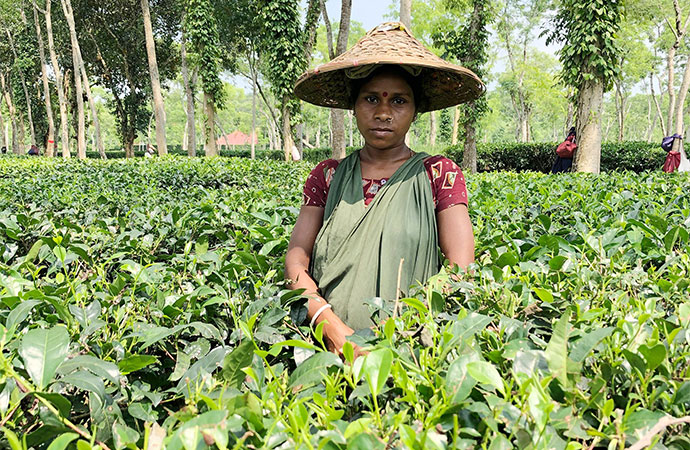Society

Finlay Tea Garden, Sreemangal, Moulvibazar. Photo: Md Arman Hossen
As dawn breaks, they consume a mug of red tea laced with salt, accompanied by two handfuls of roasted rice, before rushing to the tea gardens. Yet, they lack the means to enjoy their own produce with milk and sugar. Under the scorching sun, they toil relentlessly, walking miles and enduring backbreaking labor to collect tea leaves. During a brief midday pause, they eat rice mixed with a chutney of chilies and tea leaves, occasionally paired with puffed rice or roasted chickpeas. Thus passes the life of a tea worker. In the lush, rolling hills of Sylhet, Bangladesh, tea workers labor tirelessly to produce one of the nation's most significant exports, contributing to a record 96.5 million kg of tea in 2021 (Dhaka Law Review). These workers, primarily women and descendants of migrants brought from India by British colonial rulers over 150 years ago, have endured systemic exploitation since the inception of the tea industry. In the mid-19th century, British authorities, unable to meet the labor demands of tea plantations with local workers, recruited low-caste individuals from regions like Bihar, Odisha, and Jharkhand with false promises of prosperity. Agents known as 'Arkattis' lured them with tales of "trees that shed money" or "gold found by digging the soil." The 1863 Labour Immigration Act formalized this recruitment, but the reality was far grimmer-workers faced harsh conditions, venomous snakes, wild animals, and relentless exploitation by plantation owners. The 1921 "Mulluke Cholo" movement saw thousands attempt to return to their homelands, only to face a brutal massacre at Chandpur, where hundreds, possibly thousands, were killed by British forces Today, Sylhet's tea workers continue to face low wages, poor living conditions, environmental challenges, limited digital connectivity, and restricted educational opportunities for their children.
Remuneration Challenges
The remuneration of tea workers in Sylhet remains a critical issue, characterized by low wages and irregular payments. As of August 2022, the daily wage was set at Tk170, following protests demanding an increase to Tk300.This modest raise from Tk120 was insufficient to counter rising living costs, with workers like Raju Goala, president of the Tea Workers Union Sylhet Valley, noting, "It is difficult for us to maintain our family with Tk120 daily wages". Delays in wage payments, sometimes extending to 20 weeks, have led to strikes, such as those in May 2025, where workers blocked roads to demand arrears. The Bangladesh Tea Association claims additional benefits like housing and rations supplement wages, but workers argue these are inadequate, perpetuating financial instability.
Daily Wage: Tk170 (as of 2022)
Demanded Wage: Tk300 (unmet as of 2025)
Payment Issues: Delays up to 20 weeks, leading to protests
Struggling to Sustain Livelihoods
Living conditions for tea workers are dire, with most residing in company-provided housing that is often cramped and lacks sanitation. A 2020 study found that 82.9% of workers live in these substandard quarters, with no personal property ownership. The same study revealed that 97.1% cannot afford three daily meals, with one worker stating, "Actually, there is nobody who can manage three time meals in a day regularly; if they take one time meals, he/she suffer for hunger for two times." This leads to reliance on cheaper, less nutritious food, contributing to malnutrition, particularly among women, with 64.6% of female workers underweight. Healthcare access is limited; while 80% of workers have access to medical facilities, costly medicines and lack of bonuses hinder adequate care. Ruma Munda, a tea worker, shares, "We struggle to manage even two meals a day; three is a luxury".
Housing: 82.9% live in company houses; 0% own land
Nutrition: 97.1% cannot afford three meals; 60% skip meals regularly
Healthcare: 80% access company medical facilities; medicines costly
Environmental Pressures
Climate change significantly impacts tea workers, with rising temperatures and erratic rainfall patterns creating harsh working conditions. In 2023, workers like Phul Kumari reported unbearable heat: "It's too hot and I can't continue working. I feel like I'm standing beside the cooker in the kitchen". Heat stress and exhaustion are common, with the International Labour Organization noting risks of permanent disability or death. Droughts and heavy rainfall reduce tea yields, affecting workers' income as their pay is tied to daily leaf-plucking targets of 23-24 kg. Adaptation measures, such as providing more water and rest breaks, are minimal and insufficient to address these challenges.
Rising Temperatures: Increased heat stress, exhaustion, and health risks
Erratic Rainfall: Reduced tea yields, lower income
Adaptation Measures: Limited to water, rest breaks, and rehydration salts
Limited Digital Connectivity
The digital divide is stark for Sylhet's tea workers, with limited access to smartphones and the internet due to low income and remote locations. While internet penetration in rural Bangladesh reached 48.2% by December 2024, tea workers likely have lower access due to their socioeconomic constraints. Research suggests minimal social media engagement, as workers are isolated from mainstream society, with 91.4% feeling socially excluded. Initiatives like the UN's Joint SDG Fund aim to enhance information access, but there's no direct evidence of widespread digital inclusion. This lack of connectivity limits their ability to advocate for rights or access educational resources, further entrenching their marginalization.
Internet Access: 48.2% in rural Bangladesh (2024); likely lower for tea workers
Social Media Use: Minimal due to low income, remote locations
Impact: Increased social isolation, limited advocacy opportunities
Educational Barriers for the Next Generation
Educational opportunities for tea workers' children are severely limited, perpetuating the cycle of poverty. Only 14.3% of workers have education beyond primary level, and 51.4% have no formal education, with similar trends among their children due to scarce schools in tea garden areas. A 2018 study highlighted the lack of schools and low awareness of education's value as key barriers. Initiatives like the UN's Joint SDG Fund and the Moulvibazar Education Program by the Marist Brothers aim to improve access, providing education on health, child marriage prevention, and vocational skills. Srimoti Baouri, vice-chairperson of the Tea Workers Union, expresses hope: "I am hopeful that women like me will be able to break the cycle of poverty and exploitation... Through this initiative, we will have access to education and skills training and will be able to raise our voices against discrimination". Despite these efforts, systemic barriers like poverty and lack of infrastructure persist.
Worker Education: 14.3% beyond primary; 51.4% no formal education
Children's Education: Limited school access; high illiteracy rates
Initiatives: UN SDG Fund, Moulvibazar Education Program
The lives of tea workers remain confined within the boundaries of the tea gardens. They have no rights over the land where generations have resided. Consequently, to secure even a modest place to live, at least one family member must work in the garden. The lives of workers in the 241 registered and unregistered tea gardens across the country are woven into a nearly identical pattern. Toiling all day, they earn...
Personal stories, like those of Phul Kumari enduring unbearable heat and Ruma Munda advocating for better healthcare, underscore their resilience. Stakeholders, including the government, tea garden owners, and NGOs, must prioritize fair wages, improved housing, climate adaptation, digital inclusion, and robust educational programs to uplift this community and ensure a brighter future for their children. The historical sacrifices of the "Mulluke Cholo" movement and the ongoing struggles demand action to honor their contributions and secure their rights.
Md Arman Hoseen, Product Analyst, United News of Bangladesh.

























Leave a Comment
Recent Posts
Pedaling Through the Mangroves ...
The journey from the bustling streets of Barishal to the serene, emera ...
Why the Interim Government mus ...
Two weeks out from what is expected to be a red letter day in the figh ...
Doesn’t matter who thinks what about Bangladesh deci ..
The Other Lenin
US President Donald Trump said his administration
Govt moves to merge BIDA, BEZA, BEPZA, MIDA